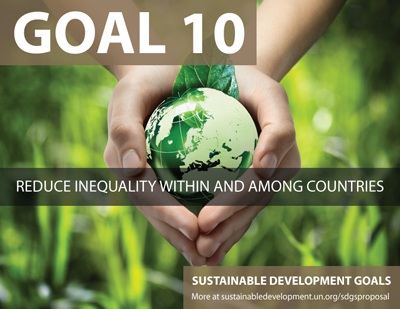|
Working Group discussing Goal 10 “Reduce inequality within and among countries”
 Reducing inequalities is crucial to achieve sustainability in developmental processes. Within a country, social-political inequalities are intertwined with economic inequalities. Inequalities appear in certain patterns which most of us are often familiar with, such as caste inequality, gender inequality, and racial-religious-language based inequality and so on. All of these patterns form numerous combinations to give rise to highly complex problems to address. In a globalized world, inequalities have beyond the country causes as well such as inequalities in access to technologies, natural and financial resources and abilities to face and adapt to changes occurring at global scale.
Reducing inequalities is crucial to achieve sustainability in developmental processes. Within a country, social-political inequalities are intertwined with economic inequalities. Inequalities appear in certain patterns which most of us are often familiar with, such as caste inequality, gender inequality, and racial-religious-language based inequality and so on. All of these patterns form numerous combinations to give rise to highly complex problems to address. In a globalized world, inequalities have beyond the country causes as well such as inequalities in access to technologies, natural and financial resources and abilities to face and adapt to changes occurring at global scale.
Education can play a key role in understanding inequalities in their various forms, patterns and combinations. Education also empowers individuals, communities and countries to reduce these inequalities as a global sustainable development goal.
The Workshop would discuss strategies towards understanding various forms of inequality and their impact on achieving overall sustainable development in those situations in participating communities/countries. The workshop would present exemplar case studies regarding role of education in reducing various forms of inequalities.
Objectives
- Enhanced understanding of inequalities in various forms and their impact on achieving sustainable development goals
- Sharing exemplar case studies on role of education towards reducing inequalities
Expected Outcomes
- Report on case studies/stories
- Directory of institutions, individuals working on this SDG and using education as a driver to achieve this goal.
- A paper on India, SDG 10 and role of education.
- Indicators and milestones – country specific and global
CEE Focal Point: Satish Awate

